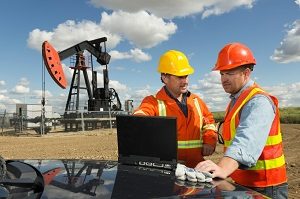
Spotlight: Upstream Energy Operations
The ‘upstream’ segment of the energy industry deals with a very complex set of operations, focusing on the exploration and production of oil and natural gas. This could range from geologic surveys and information gathering to the actual drilling and bringing oil/natural gas resources to the surface. This type of business faces a number of potential pollution exposures and it is critical that the right coverage is in place to protect the company in the event of a loss.
Target risks include:
Oilfield Contractors: Roustabout contractors, pipe/flowline contractors, site prep contractors, site construction contractors, electrical Contractors, soil remediation contractors, and salt water haulers.
Oilfield Consultants: “Landmen,” water consultants/brokers, company ‘eyes and ears’ consultants, health and safety training consultants, equipment rental, manufacturer’s representatives, etc.
Oilfield Product Manufacturers: Fittings, pipes, gaskets, valves, chemicals (including blending), pressure vessels, tanks (pressurized, frac, or otherwise).
Oilfield Sites: Saltwater disposal wells, contractor’s yards, well schedules, pipelines (of all kinds), above & below ground storage tank farms, blending facilities, etc.
Environmental Exposures for Upstream Facilities
Job Site
- Oil production wells and pipelines have extensive piping, pumps, valves with product flowing through and no secondary containment. Spills of drilling fluids, fracture fluids and wastewater from fracture flow backs could happen as well as spills from fuels and lubricants.
- Air emissions such as fumes from chemicals (sealants, curing compounds, adhesives, lead based paint,etc.).
- Air emissions from project activities, such as welding (manganese), concrete cutting (silica dust), or combustion engines (carbon monoxide, nitrogen oxides, particulates).
- Spills of oil used, transferred, or stored at jobsite in bulk quantities may result in spills. If these spills reach navigable waters, then the jobsite entities could be required to pay for cleanup costs and natural resource damages, as well as administrative/civil fines.
- Moving soil that contains hazardous chemicals from one part of the jobsite to another or off-site may cause the contractors to be held liable for cleanup under environmental regulations.
- Migration of natural gas into freshwater zones during or after oil field work.
- Underground storage tanks could be punctured; materials below ground containing pollutants could be broken open which could result in pollution spills below ground incurring cleanup costs; bodily injury (from contaminated drinking water wells, for example) or third party property damage claims.
- Stormwater may be discharged which often contains pollutants such as sediment, debris, or chemicals transported to local storm sewers, surface waters, or drinking water wells. This can cause fish kills or adversely affect drinking water quality and could lead to claims against oil & gas entities for bodily injury, property damage, or cleanup costs.
Transportation of waste or materials to or from a job site
- Spills may occur while chemicals or equipment are being transported to or from the job site, or during loading/unloading (ex. oil or salt water from jobsites).
- Spills may occur while waste, debris, etc. are being transported from the job site to a disposal site.
Disposal of waste
- Jobsite debris may be inadvertently mixed with hazardous waste and then disposed of improperly, causing contamination conditions at the landfill or disposal facility. This may result in claims against the landfill or disposal facility which could come back to the original generator (jobsite manager or subcontractors).
- Improper disposal which results in soil or groundwater contamination as a result of inappropriate wastewater disposal.
Insureds owned premises
- Contamination at owned premises caused by the maintenance or storage of heavy equipment, mobile equipment, or vehicles.
- Storage of paints, chemicals, solvents, etc. at owned premises.
Learn about Sudden & Accidental coverage and how this affects contractors working in this industry.
Want to learn more about exposures and coverage for upstream energy operations? Contact us to request complete information.
Type: Blog
Topic: Oil and Gas